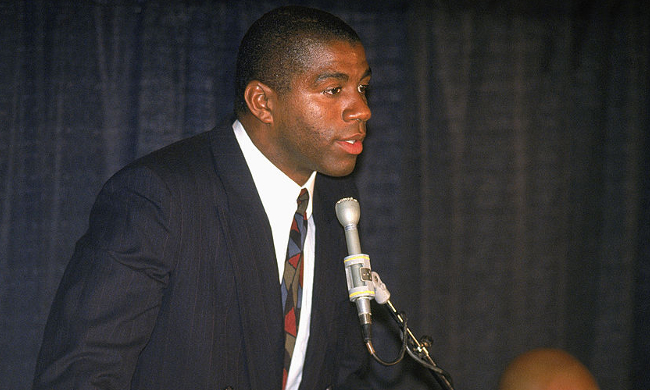
On this day 25 years ago, Earvin “Magic” Johnson retired from professional basketball at age 32 because he had contracted the HIV virus. In a brief-but-emotional press conference, the three-time MVP, joined by his wife and college sweetheart, Cookie Johnson, told the world: “Because of the HIV virus that I have attained, I will have to retire from the Lakers, today.”
His wife, he continued, was “fine” and “negative,” as was their unborn child. Magic and Cookie had only been married for 45 days before that unforgettable announcement, but as they had several times in their “roller coaster” relationship that began at Michigan State, they worked through it and celebrated their 25th wedding anniversary last month with the release of her memoir. But then, everything about this press conference has become cause for celebration, because the public believed at that time that HIV meant AIDS, and that AIDS was a death sentence.
As a celebrity with HIV, Magic inherited the exceptional responsibility of being the face of something so terrifying and stigmatized. On that day, though, he made two promises. First, to the media: “I plan on going on, living for a long time, bugging you guys, like I always have.”
Second, to the nameless people fighting a costly losing battle with HIV:
I will now become a spokesman for the HIV virus because I want people — young people to realize that they can practice safe sex. And you know sometimes you’re a little naive about it and you think it could never happen to you. You only thought it could happen to, you know, other people and so on and all. And it has happened, but I’m going to deal with it and my life will go on.
Magic was immediately praised by the medical community for his bravery, as Lakers team physician Michael Mellman told the Los Angeles Times:
“What we have witnessed is a courageous act by a very special person. He is not compelled by any legal description or legal requirement to disclose what he has disclosed today.
“He is not a person who is invisible. Because of his presence and potential impact on society, with a situation that is not only serious but from which we are all at risk, I think he should not only be commended but held as a modern-day hero.
“This is a very, very special person and a very special admission.”
On Monday, Magic wrote about the anniversary and his “celebration of life” for his website, The Playbook, and credited his faith for allowing him to take his new role head-on.
November 7, 1991 was a life changing day that I never saw coming. However, unlike the excitement that characterized the summer of 1979, it was followed by despair. Up until then, I thought the hardest thing I’d ever done was play against Michael Jordan or Larry Bird, but on this day I began the fight of my life. This day, I began to realize how God was working in my life. My faith gave me strength to stand up and tell the world that I had contracted Human Immunodeficiency Virus (HIV).
Though I had accepted my new status, telling the world was a different ordeal. In the early 1990s hearing about anyone with HIV/AIDS meant that they didn’t have long to live. I felt it was my duty to educate as many people as I could about the disease. It was then that I began my new journey to walk every day in God’s purpose. Today, I continue to do everything I can to bring awareness and education about this disease to the community.
Of course, Magic has had a little more help than the kind that comes from above, as he shared on Twitter.
Thank you God for good health! Thank you Dr. David Ho, the most acclaimed HIV/AIDS Dr in the world for taking care of me for the last 25yrs.
— Earvin Magic Johnson (@MagicJohnson) November 7, 2016
As the Orange County Register points out, many of today’s rising NBA stars weren’t even born when Magic made his big announcement. They know his story now, obviously, but he’s not “HIV-positive Magic Johnson” to them. Instead, he’s just an NBA legend and a successful, beloved businessman.
“I don’t think people know him for that,” said D’Angelo Russell, who was born in the middle of Johnson’s second comeback in 1996. “When you say Magic Johnson, you know so many other things for his legacy as far as donating, the smile he had through all the downs, the winning legacy that he left behind. So, you don’t think of HIV when you think of Magic.”
Said Larry Nance Jr., 23: “I don’t think of any of that. I think of the Lakers. I think of all the amazing passes he had.”
But are today’s NBA players old enough to remember the hilarious awkwardness of The Magic Hour? That’s probably a different conversation for another anniversary.






